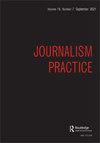《禁闭:新冠疫情中心的地方新闻编辑室管理数字化转型
IF 2
2区 文学
Q2 COMMUNICATION
引用次数: 0
摘要
为了应对Covid-19大流行,新闻编辑室尽可能快地为信息匮乏的受众提供信息。在爱沙尼亚,Covid-19最初影响了两个大岛,作为预防措施,这导致它们与大陆隔离。因此,地方新闻变得比以往任何时候都更加重要,向需要指导和信息的受众提供新闻,并向全国其他地区通报病毒对岛屿人民造成的后果。考虑到当地人的压力,爱沙尼亚其他地区的利益,以及不熟悉的紧急情况,我们的研究重点是爱沙尼亚在萨列马岛和希乌马岛封锁中心的当地新闻编辑室的数字新闻方法。我们进行了八次半结构化访谈。结果表明,当地记者对封锁期间(和之前)在线存在的重要性了解有限,因此缺乏进行数字化转变的意愿。记者缺乏数字平台及其特殊性的技能和知识,也阻碍了这种转变。总的来说,我们称岛上的当地记者为“数字初学者”。关键词:地方新闻;covid -19紧急情况;数字新闻;;数字转变;;本研究由业务计划研究、发展与教育项目“Postdoc2MUNI”资助[批准号:CZ.02.2.69/0.0/0.0/18_053/0016952]。本文章由计算机程序翻译,如有差异,请以英文原文为准。
Locked Up: Local Newsrooms Managing a Digital Shift at the Centre of the Covid-19 Outbreak
ABSTRACTIn response to the Covid-19 pandemic, newsrooms mediated information as quickly as possible for their information-starved audience. In Estonia, Covid-19 initially impacted two large islands, which led to their isolation from the mainland as a precaution. Therefore, local journalism became more crucial than ever, providing news with proximity to the audience members who needed guidance and information, and informing the rest of the nation about the consequences the virus was having on the people of the islands. Considering the pressure on the locals, the interest of the rest of Estonia, and the unfamiliar emergency situation, our study focuses on local newsrooms’ approaches to digital news at the centre of Estonia’s lockdown on the islands of Saaremaa and Hiiumaa. We conducted eight semi-structured interviews. The results indicate that local journalists had a limited understanding of the importance of their online presence during (and before) the lockdown, and, therefore, lacked the willingness to carry out the digital shift. The shift was also hindered by the journalists’ lack of skills and knowledge of digital platforms and their specificity. Overall, we call local journalists on the islands “digital beginners”.KEYWORDS: Local journalismCovid-19emergencydigital journalismdigital shiftlocal journalists Disclosure StatementNo potential conflict of interest was reported by the author(s).Additional informationFundingThis work was supported from Operational Programme Research, Development and Education – Project “Postdoc2MUNI” [grant number CZ.02.2.69/0.0/0.0/18_053/0016952].
求助全文
通过发布文献求助,成功后即可免费获取论文全文。
去求助
来源期刊

Journalism Practice
COMMUNICATION-
CiteScore
5.50
自引率
14.30%
发文量
111
期刊介绍:
ournalism Practice provides opportunities for reflective, critical and research-based studies focused on the professional practice of journalism. The emphasis on journalism practice does not imply any false or intellectually disabling disconnect between theory and practice, but simply an assertion that Journalism Practice’s primary concern is to analyse and explore issues of practice and professional relevance. Journalism Practice is an intellectually rigorous journal with all contributions being refereed anonymously by acknowledged international experts in the field. An intellectually lively, but professionally experienced, Editorial Board with a wide-ranging experience of journalism practice advises and supports the Editor. Journalism Practice is devoted to: the study and analysis of significant issues arising from journalism as a field of professional practice; relevant developments in journalism training and education, as well as the construction of a reflective curriculum for journalism; analysis of journalism practice across the distinctive but converging media platforms of magazines, newspapers, online, radio and television; and the provision of a public space for practice-led, scholarly contributions from journalists as well as academics. Journalism Practice’s ambitious scope includes: the history of journalism practice; the professional practice of journalism; journalism training and education; journalism practice and new technology; journalism practice and ethics; and journalism practice and policy.
 求助内容:
求助内容: 应助结果提醒方式:
应助结果提醒方式:


